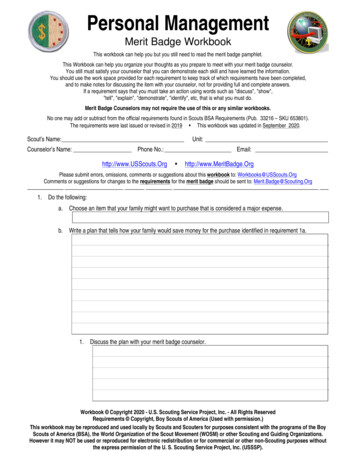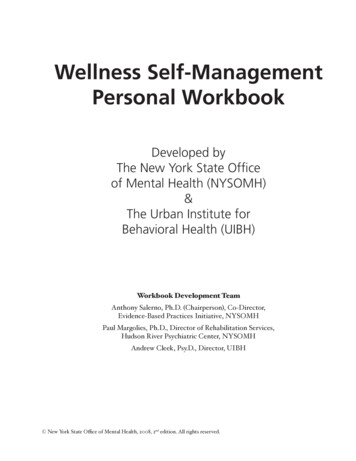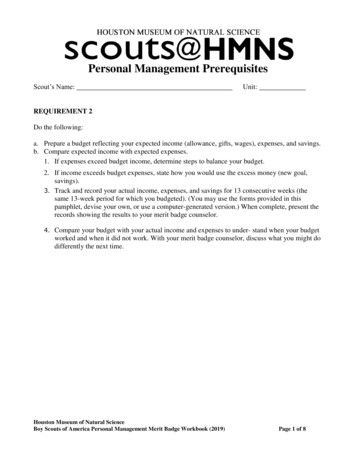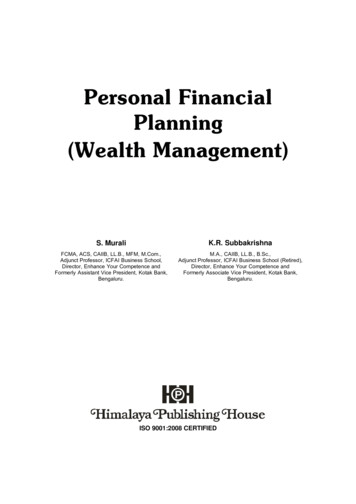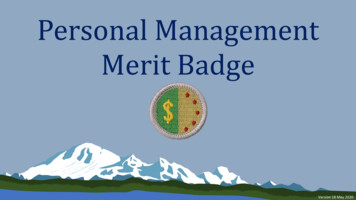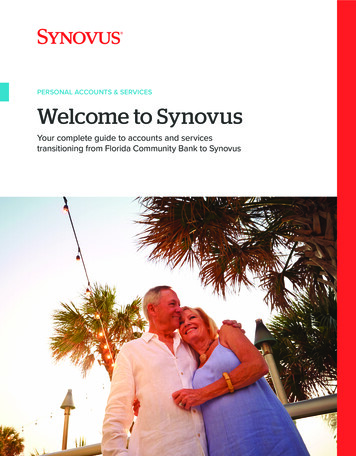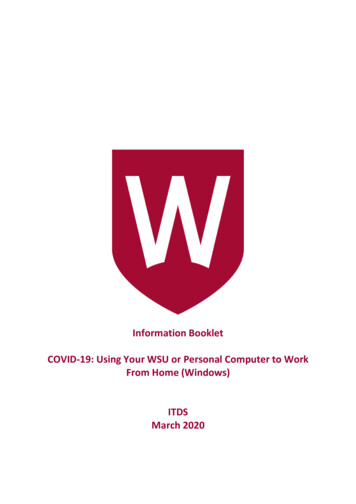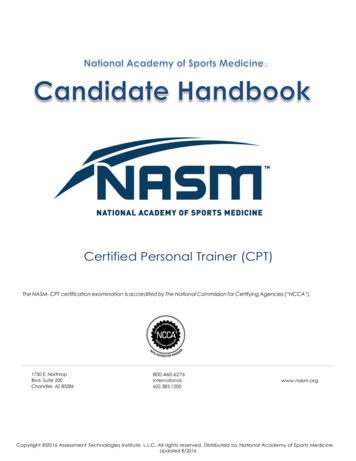Transcription
Personal ManagementMerit Badge WorkbookThis workbook can help you but you still need to read the merit badge pamphlet.The work space provided for each requirement should be used by the Scout to make notes for discussing the item with his counselor, not forproviding the full and complete answers. Each Scout must do each requirement.No one may add or subtract from the official requirements found in Boy Scout Requirements (Pub. 33216 – SKU 34765).The requirements were last issued or revised in 2004 This workbook was updated in November 2013.Scout’s Name:Unit:Counselor’s Name:Counselor’s Phone No.:http://www.USScouts.Org http://www.MeritBadge.OrgPlease submit errors, omissions, comments or suggestions about this workbook to: Workbooks@USScouts.OrgComments or suggestions for changes to the requirements for the merit badge should be sent to: Merit.Badge@Scouting.Org1. Do the following:a. Choose an item that your family might want to purchase that is considered a major expense.b. Write a plan that tells how your family would save money for the purchase identified in requirement 1a.1. Discuss the plan with your merit badge counselor.Workbook Copyright 2013 - U.S. Scouting Service Project, Inc. - All Rights ReservedRequirements Copyright, Boy Scouts of America (Used with permission.)
Personal ManagementScout's Name:2. Discuss the plan with your family.3. Discuss how other family needs must be considered in this plan.c. Develop a written shopping strategy for the purchase identified in requirement la.1. Determine the quality of the item or service (using consumer publications or ratings systems).Personal Management - Merit Badge WorkbookPage. 2 of 20
Personal ManagementScout's Name:2. Comparison shop for the item. Find out where you can buy the item for the best price. (Provide pricesfrom at least two different price sources.)SourcePriceCall around; study ads. Look for a sale or discount coupon. Consider alternatives.Can you buy the item used?Should you wait for a sale?2. Do the following: a. Prepare a budget reflecting your expected income (allowance, gifts, wages), expenses, and savings. Trackyour actual income, expenses, and savings for 13 consecutive weeks. (You may use the forms provided in thispamphlet, devise your own, or use a computer-generated version.) When complete, present the results to yourmerit badge counselor.(There is a blank Sample Budget Plan table and a blank table for tracking your actual income and expensesthat you can use at the end of this workbook.) b. Compare expected income with expected expenses.1. If expenses exceed income, determine steps to balance your budget.Personal Management - Merit Badge WorkbookPage. 3 of 20
Personal ManagementScout's Name:2. If income exceeds expenses, state how you would use the excess money (new goal, savings).3. Discuss with your merit badge counselor FIVE of the following concepts: a. The emotions you feel when you receive money. b. Your understanding of how the amount of money you have with you affects your spending habits. c. Your thoughts when you buy something new and your thoughts about the same item three months later.Explain the concept of buyer's remorse. d. How hunger affects you when shopping for food items (snacks, groceries).Personal Management - Merit Badge WorkbookPage. 4 of 20
Personal Management Scout's Name:e. Your experience of an item you have purchased after seeing or hearing advertisements for it.Did the item work as well as advertised? f. Your understanding of what happens when you put money into a savings account. g. Charitable giving. Explain its purpose and your thoughts about it. h. What you can do to better manage your money.Personal Management - Merit Badge WorkbookPage. 5 of 20
Personal ManagementScout's Name:4. Explain the following to your merit badge counselor:a. The differences between saving and investing, including reasons for using one over the other.Saving:Investing:Reasons for using one over the other:b. The concepts of return on investment and risk.c. The concepts of simple interest and compound interest and how these affected the results of your investmentexercise.Simple interest:Compound interest:Personal Management - Merit Badge WorkbookPage. 6 of 20
Personal ManagementScout's Name:How these affected the results of your investment exercise:5. Select five publicly traded stocks from the business section of the newspaper.StockCurrent Price1 Day Change52-Week High52-Week LowExplain to your merit badge counselor the importance of the following information for each stock:a. Current priceb. How much the price changed from the previous day.c. The 52-week high and the 52-week low pricesPersonal Management - Merit Badge WorkbookPage. 7 of 20
Personal ManagementScout's Name:6. Pretend you have 1,000 to save, invest, and help prepare yourself for the future. Explain to your merit badge counselorthe advantages or disadvantages of saving or investing in each of the following:AdvantagesDisadvantagesa. Common stocksb. Mutual fundsc. Life insuranced. A certificate ofdeposit (CD)Personal Management - Merit Badge WorkbookPage. 8 of 20
Personal ManagementScout's Name:e. A savingsaccount orU.S. savingsbond7. Explain to your merit badge counselor the following:a. What a loan is, what interest is, and how the annual percentage rate (APR) measures the true cost of a loan.What a loan is:What interest is:How the annual percentage rate (APR) measures the true cost of a loan:b. The different ways to borrow money.Personal Management - Merit Badge WorkbookPage. 9 of 20
Personal ManagementScout's Name:c. The differences between a charge card, debit card, and credit card.Charge cardDebit card,Credit card.What are the costs and pitfalls of using these financial tools?Explain why it is unwise to make only the minimum payment on your credit card.Personal Management - Merit Badge WorkbookPage. 10 of 20
Personal ManagementScout's Name:d. Credit reports and how personal responsibility can affect your credit report.Credit reports:How personal responsibility can affect your credit report:e. Ways to reduce or eliminate debt.8. Demonstrate to your merit badge counselor your understanding of time management by doing the following: a. Write a "to do" list of tasks or activities, such as homework assignments, chores, and personal projects, thatmust be done in the coming week. List these in order of importance to you. b. Make a seven-day calendar or schedule. Put in your set activities, such as school classes, sports practices orgames, jobs or chores, and/or Scout or church or club meetings, then plan when you will do all the tasks fromyour "to do" list between your set activities. c. Follow the one-week schedule you planned. Keep a daily diary or journal during each of the seven days of thisweek's activities, writing down when you completed each of the tasks on your "to do" list compared to when youscheduled them. d. Review your "to do" list, one-week schedule, and diary/journal to understand when your schedule worked andwhen it did not work.(There is a blank table which can be used for tracking your “to do” list at the end of this workbook.)Personal Management - Merit Badge WorkbookPage. 11 of 20
Personal ManagementScout's Name:With your merit badge counselor, discuss and understand what you learned from this requirement and what youmight do differently the next time.9. Prepare a written project plan demonstrating the steps below, including the desired outcome. This is a project on paper,not a real-life project. Examples could include planning a camping trip, developing a community service project or aschool or religious event, or creating an annual patrol plan with additional activities not already included in the troopannual plan. Discuss your completed project plan with your merit badge counselor.a. Define the project. What is your goal?b. Develop a timeline for your project that shows the steps you must take from beginning to completion.c. Describe your project.Personal Management - Merit Badge WorkbookPage. 12 of 20
Personal ManagementScout's Name:d. Develop a list of resources. Identify how these resources will help you achieve your goal.e. If necessary, develop a budget for your project.Personal Management - Merit Badge WorkbookPage. 13 of 20
Personal ManagementScout's Name:10. Do the following:a. Choose a career you might want to enter after high school or college graduation.b. Research the limitations of your anticipated career and discuss with your merit badge counselor what you havelearned about qualifications such as education, skills, and experience.Requirement resources can be found onal Management#Requirement resourcesPersonal Management - Merit Badge WorkbookPage. 14 of 20
Personal ManagementScout's Name:Sample Budget PlanBudgeted AmountsIncome SourcesActual Amountsper Week Month 1 Month 2 Month 3 TotalMonth 1 Month 2 Month 3TotalTot. ActualTot. Budgetper Week Month 1 Month 2 Month 3 TotalMonth 1 Month 2 Month 3TotalAct.-BudgetAllowanceGiftsWagesOtherIncome TotalsExpensesSavings-pay yourself 1stDonations/CharityFood/Meals outClothingEntertainment/MoviesCDs/DVDs, iftsOther:Expense TotalsIncome - ExpensesPersonal Management - Merit Badge WorkbookPage. 15 of 20
Personal ManagementScout's Name:Table for tracking your actual income, expenses, and savings for 13 consecutive weeks.DateDescription of Daily Income and ExpensesWeek 1DepositPage 1 of 4WithdrawalBalanceOpening BalanceWeek 2Week 3Week 4Personal Management - Merit Badge WorkbookPage. 16 of 20
Personal ManagementScout's Name:Table for Tracking your actual income, expenses, and savings for 13 consecutive weeks. Page 2 of 4DateDescription of Daily Income and ExpensesDepositWithdrawalBalanceWeek 5Week 6Week 7Week 8Personal Management - Merit Badge WorkbookPage. 17 of 20
Personal ManagementScout's Name:Table for Tracking your actual income, expenses, and savings for 13 consecutive weeks. Page 3 of 4DateDescription of Daily Income and ExpensesDepositWithdrawalBalanceWeek 9Week 10Week 11Week 12Personal Management - Merit Badge WorkbookPage. 18 of 20
Personal ManagementScout's Name:Table for Tracking your actual income, expenses, and savings for 13 consecutive weeks.DateDescription of Daily Income and ExpensesDepositPage 4 of 4WithdrawalBalanceWeek 13Planned “To Do” Schedule“To Do” TasksScheduled TimeActual Completion Times for Each TaskDay 1Personal Management - Merit Badge WorkbookDay 2Day 3Day 4Day 5Day 6Day 7Page. 19 of 20
Important excerpts from the Guide To Advancement - 2013, No. 33088 (SKU-618673)[1.0.0.0] — IntroductionThe current edition of the Guide to Advancement is the official source for administering advancement in all Boy Scouts of America programs: CubScouting, Boy Scouting, Varsity Scouting, Venturing, and Sea Scouts. It replaces any previous BSA advancement manuals, including AdvancementCommittee Policies and Procedures, Advancement and Recognition Policies and Procedures, and previous editions of the Guide to Advancement.[Page 2, and 5.0.1.4] — Policy on Unauthorized Changes to Advancement ProgramNo council, committee, district, unit, or individual has the authority to add to, or subtract from, advancement requirements. There are limitedexceptions relating only to youth members with special needs. For details see section 10, “Advancement for Members With Special Needs”.[Page 2] — The “Guide to Safe Scouting” AppliesPolicies and procedures outlined in the Guide to Safe Scouting, No. 34416, apply to all BSA activities, including those related to advancement andEagle Scout service projects.[7.0.3.1] — The Buddy System and Certifying CompletionA youth member must not meet one-on-one with an adult. Sessions with counselors must take place where others can view the interaction, or theScout must have a buddy: a friend, parent, guardian, brother, sister, or other relative—or better yet, another Scout working on the same badge—alongwith him attending the session.When the Scout meets with the counselor, he should bring any required projects. If these cannot be transported, he should present evidence, such asphotographs or adult verification. His unit leader, for example, might state that a satisfactory bridge or tower has been built for the Pioneering meritbadge, or that meals were prepared for Cooking. If there are questions that requirements were met, a counselor may confirm with adults involved.Once satisfied, the counselor signs the blue card using the date upon which the Scout completed the requirements, or in the case of partials, initialsthe individual requirements passed.Note that from time to time, it may be appropriate for a requirement that has been met for one badge to also count for another. See “Fulfilling MoreThan One Requirement With a Single Activity,” 4.2.3.6.[7.0.3.2] — Group InstructionIt is acceptable—and sometimes desirable—for merit badges to be taught in group settings. This often occurs at camp and merit badge midways orsimilar events. Interactive group discussions can support learning. The method can also be attractive to “guest experts” assisting registered andapproved counselors. Slide shows, skits, demonstrations, panels, and various other techniques can also be employed, but as any teacher can attest,not everyone will learn all the material.There must be attention to each individual’s projects and his fulfillment of all requirements. We must know that every Scout —actually andpersonally— completed them. If, for example, a requirement uses words like “show,” “demonstrate,” or “discuss,” then every Scout must do that. It isunacceptable to award badges on the basis of sitting in classrooms watching demonstrations, or remaining silent during discussions.It is sometimes reported that Scouts who have received merit badges through group instructional settings have not fulfilled all the requirements. Tooffer a quality merit badge program, council and district advancement committees should ensure the following are in place for all group instructionalevents. Merit badge counselors are known to be registered and approved. Any guest experts or guest speakers, or others assisting who are not registered and approved as merit badge counselors, do not accept theresponsibilities of, or behave as, merit badge counselors, either at a group instructional event or at any other time. Their service is temporary, notongoing. Counselors agree not to assume prerequisites have been completed without some level of evidence that the work has been done. Pictures andletters from other merit badge counselors or unit leaders are the best form of prerequisite documentation when the actual work done cannot bebrought to the camp or site of the merit badge event. There is a mechanism for unit leaders or others to report concerns to a council advancement committee on summer camp merit badge programs,group instructional events, and any other merit badge counseling issues—especially in instances where it is believed BSA procedures are notfollowed. See “Reporting Merit Badge Counseling Concerns,” 11.1.0.0. There must be attention to each individual’s projects and his fulfillment of all requirements. We must know that every Scout—actually andpersonally—completed them.[7.0.3.3] — Partial CompletionsA Scout need not pass all the requirements of one merit badge with the same counselor. It may be that due to timing or location issues, etc., he mustmeet with a different counselor to finish the badge. The Application for Merit Badge has a place to record what has been finished—a “partial.” In thecenter section on the reverse of the blue card, the counselor initials for each requirement passed. In the case of a partial completion, the counselordoes not retain his or her portion of the card. A subsequent counselor may choose not to accept partial work, but this should be rare. A Scout, if hebelieves he is being treated unfairly, may work with his unit leader to find another counselor. An example for the use of a signed partial would be totake it to camp as proof of prerequisites. Partials have no expiration except the Scout’s 18th birthday. Units, districts, or councils shall not establishother expiration dates for partial merit badges.[7.0.4.8] — Unofficial Worksheets and Learning AidsWorksheets and other materials that may be of assistance in earning merit badges are available from a variety of places including unofficial sourceson the Internet and even troop libraries. Use of these aids is permissible as long as the materials can be correlated with the current requirements thatScouts must fulfill. Completing “worksheets” may suffice where a requirement calls for something in writing, but this would not work for a requirementwhere the Scout must discuss, tell, show, or demonstrate, etc. Note that Scouts shall not be required to use these learning aids in order to complete amerit badge.Attachment(NOTE: It is not necessary to print this page.)Page 20 of 20
Personal Management - Merit Badge Workbook Page. 12 of 20 With your merit badge counselor, discuss and understand what you learned from this requirement and what you might do differently the next time. 9. Prepare a written project plan demonstrating the steps below, including the desired outc

